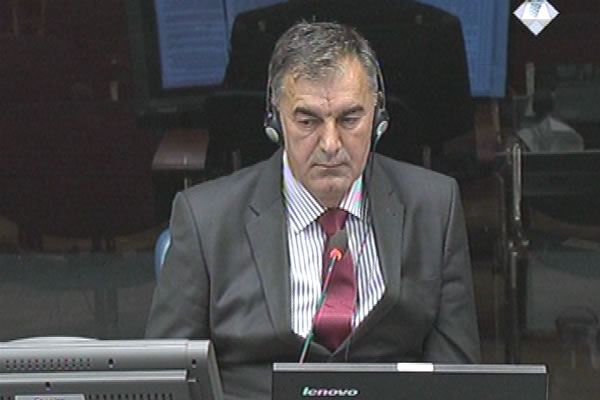Home
WAR CRIMES IN 'VACUUM'
According to witness Slobodan Radulj, former state attorney in Prijedor and deputy military prosecutor in Banja Luka, in the first year of the war there was a 'legal vacuum', which was an ideal environment for thieves and criminals. It is difficult to comprehend the crimes that happened as a result
 Slobodan Radulj, defence witness at Rako Mladic trial
Slobodan Radulj, defence witness at Rako Mladic trial From May 1992 to October 1993, Slobodan Radulj, who is now the state attorney in Republika Srpska, served as the state attorney in Prijedor. At the trial of Ratko Mladic, the witness described the period at the time when new Serb authorities were created. This resulted in a 'vacuum which was an ideal environment for thieves and criminals', Radulj noted. Through Radulj's evidence Mladic's defense wants to contest the charges related to the persecution of the non-Serbs. In some municipalities, such as Prijedor, the persecution reached the scale of genocide.
From October 1993 to the end of the war, Radulj was a deputy military prosecutor in Banja Luka. His jurisdiction covered the area of responsibility of the 1st and 2nd Krajina Corps. As he was questioned by Mladic's defense counsel Miodrag Stojanovic, the witness explained that he took part in prosecuting perpetrators of crimes against non-Serbs. Judge Orie asked the witness to give an example of a criminal case that involved any of the war crimes listed in the indictment against Mladic. Radulj was not able to name a single such example. Instead, Radulj said that when the war ended he tried to continue the investigation in the case against Goran Amidzic. Amidzic was involved in the killing of 80 Bosniaks from the village of Velagici near Kljuc on 1 June 1992. It was impossible to prosecute the perpetrators responsible for that crime during the war because their fellow fighters rioted, saying that they would leave their positions, the witness explained.
Prosecutor Arthur Traldi confronted Radulj in the cross-examination with the statement Radulj gave to the OTP investigators in 2002. There, the witness said that the Amidzic case was the only war crimes case that was prosecuted in Republika Srpska during the war. Also, Radulj noted in the statement that the military prosecutor informed him that he 'was instructed not to use the term war crime' for the crimes against non-Serbs. Radulj stuck to his statement specifying that the procedure was put in place because the 'state of war was not declared in Republika Srpska'. According to Radulj, only the state of an imminent risk of war was declared.
In his statement to the investigators in 2002, the witness said that during the war Serb soldiers who committed crimes against Serbs were prosecuted 'quite efficiently' during the war. Those cases were 'prioritized', the witness noted, while the crimes against Croats and Bosniaks were 'set aside for some other time'.
The prosecutor highlighted the first moves made by the Serb authorities in Prijedor vis-à-vis their fellow citizens of Muslim and Croat ethnicity. The first thing they did was to start killing and arresting eminent Prijedor citizens. Then a huge number of Muslims and Croats were laid off, transferred to prison camps and expelled from their homes. In a nutshell, the prosecutor noted, when the Serbs established their power in Prijedor, the town that used to live according to the code of brotherhood and unity ceased to exist. Radulj agreed with the allegation.
Linked Reports
- Case : Mladic
- 2015-05-12 WHO WERE THE VICTIMS OF ORIC'S ATTACK ON BIJELOVAC: CIVILIANS OR SOLDIERS?
- 2015-05-12 WAS PECANAC MLADIC'S MAN FOR 'SPECIAL TASKS'?
- 2015-05-11 SETTING UP EXECUTION SQUAD FOR BRANJEVO
- 2015-05-14 WHAT HAPPENED TO PRIJEDOR MEDICAL DOCTORS?
- 2015-05-18 WHAT DID MLADIC'S ARMY WANT TO ACHIEVE?
- 2015-05-19 PUBLIC DECEIVED ABOUT 'DEFENSIVE' MILITARY ACTIONS
